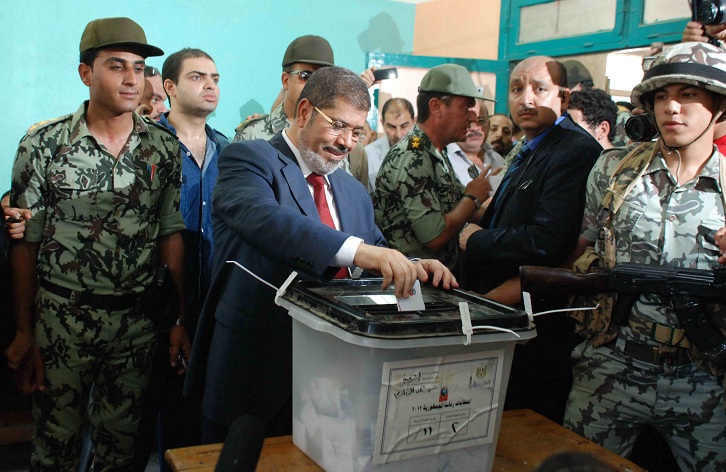
Mohamed Omar
President Mohamed Morsy made numerous promises for his first 100 days in office, to improve five aspects of life in Egypt. During a speech to commemorate the 1973 War on 6 October, Morsy gave himself a performance review.
“I take responsibility with you and before you for the 100 days and beyond the 100 days,” he said before offering statistics on how many goals he had achieved. Despite his claims, many remain sceptical of the progress made.
Morsy’s progress compared against Morsi Meter
Morsy said he would improve the quality and availability of bread, which poor Egyptians had to queue for during former President Hosni Mubarak’s era. After waiting they would buy poor quality subsidised bread. In some instances, deadly fights over bread broke out between people queuing. “Around 80 per cent of the goals have been achieved,” Morsy claimed, adding that quality still needs to be improved.
A watchdog website, “Morsi Meter”, set up to evaluate the fulfilment of Morsy’s promises during his first 100 days, tells a different story. Of the 13 promises Morsy made regarding bread, the website reported that only three have been achieved and seven more were in progress.
Morsy said he would improve access to and availability of household gas and fuel at the pump, both of which have been in short supply. Butane gas cylinders are subsidised so that the less fortunate have access to fuel in their homes. Similar to the bread queues, during Mubarak’s era it was not unknown for deadly fights to break out in butane gas queues. “We have achieved 85 per cent of the household needs of gas cylinders,” said Morsy.
Among the reasons he gave for not doing better was the smuggling of fuel. “In just two months, 23 million litres of fuel have been seized,” he said. Morsi Meter reported that of the five promises related to fuel, a promise to implement deterrent punishments for smugglers has been achieved and one of the remaining four is in progress; to deliver butane gas cylinders to people’s homes, which corroborates Morsy’s claimed achievements.
In what may be a prelude to lifting fuel subsidies, Morsy said subsidies are not being received by those who need them. He said that if someone can afford 95 octane fuel, they should not receive a subsidy.
Regarding security, he said that 70 per cent of his goals have been achieved. He saluted the men of the “ministry of Interior [Ministry]” for their efforts. Morsi Meter claims that only one of the promises Morsy made regarding security has been met; to give promotions and benefits to police officers, commensurate with performance.
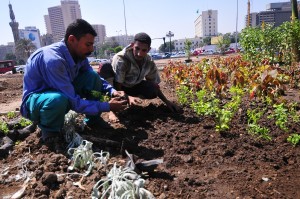
Hassan Ibrahim / DNE
Morsy claimed that he’d achieved 60 per cent of his promises regarding traffic. Morsi Meter on the other hand estimates that only one of his 21 promises to improve traffic has been completed.
Around 40 per cent of promises related to cleanliness were achieved, Morsy claimed. He said over 600,000 tons of garbage have been removed from the Greater Cairo region, 200,000 tons form Alexandria and 350,000 from other governorates. According to Morsi Meter, this is the only sector in which all of the president’s goals have either been achieved or are in progress.
REACTIONS
People on the street
Though his own estimate of progress differs from that of Morsi Meter’s, the president has set in motion changes that may bear fruit in years to come, according to people in the street.
Abu Khalid, a businessman in his 30s, said while Morsy has yet to deliver on most of his promises to bring about real change, patience was what Egyptians needed. “I want what is best for my family,” Abu Khalid said. “The president can’t be expected to undo in 100 days what Mubarak did in 30 years.” He believed that whatever his shortcomings, Morsy is infinitely better than his predecessor.
Abu Khalid’s reality is not shared by everyone however. Moustafa is an elderly man who lives below the poverty line and relies on public transport. In his youth he said he often defended Mubarak’s policies. He admits that security is improving but does not give Morsy full credit for this. Moustafa scoffed at the idea of there being any kind of improvement to traffic, as the Metro had just been cancelled and the streets were packed with cars unable to move due to the chaos.
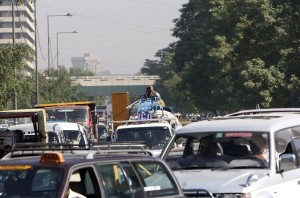
Daily News Egypt
A young woman named Yasmine was disappointed people took him literally. “Anyone who expected Morsy to fulfill his promise is a fool,” Yasmine said. “He has not done enough for the poor but even so, 100 days is unrealistic.”
To Ahmed Nasr, 33, a civil engineer who opposes the Muslim Brotherhood, Morsy has yet to prove his worth as president. “All he cares about, is establishing a place for him and his party in Egypt,” he said. The way Morsy spoke during his election campaign made him sound as if he knew what he was doing, “but he has not put enough effort into his work domestically”. To him, there is no excuse for the current state of security. What confounds Nasr is why Morsy has failed to restore security in Egypt if he has the Supreme Council of Armed Forces (SCAF) in his pocket and the interior minister is a Muslim Brotherhood member. “He should not make promises he can’t keep,” Nasr said. “The leader of a nation should set the right example.”
While many people have begun expressing their displeasure at Morsy’s failure to achieve his promises, most people have admitted their expectations were more wishful thinking than a standard by which their president could be judged.
NGOs
During Morsy’s first 100 days there has been much focus on the issue of human rights. Many NGOS have condemned Morsy for not doing enough to implement change.
Human Rights Watch (HRW) Egypt researcher, Heba Morayef said, “looking at Morsy’s rhetoric, human rights are not a priority… the focus was on reforming the police, a source of much of the human rights abuses in Egypt.”
On a positive note, Morayef highlighted the two committees set up by Morsy, one to review the cases of civilians tried before military courts and the other to investigate the cases of killings and injuries of demonstrators between 25 January 2011 and 30 June 2012. She said the success of these committees has been limited.
Many expected to experience greater freedom of expression under Morsy. However this has not been the case. For example, a TV show, Nahark Sa’id, is currently being investigated for allowing a guest to criticise Morsy.
The Arab Network for Human Rights released a report which they claim, “exposes the absence of the regime’s political will in Egypt… to respect the freedom of opinion, expression and freedom of the press after three months of Morsy’s rule.” The report highlights 43 examples of restrictions on freedom of expression during Morsy’s first 100 days including censorship, prosecution of journalists and contempt of religion.
Academics
A political science professor at American University Cairo (AUC), who has written on the Arab Spring, Nadine Sika, said, “unfortunately I do not see any progress in the 100 days. I see only talk and rhetoric without ‘real’ policies. The government is doing ‘crisis management’ rather than ‘public policy’…. The due process of law is far from being implemented in sectarian issues, which increases the problem.”
A fellow AUC political science professor, Christian Donath, pointed out however the immense challenges Morsy faced in achieving progress. “Take, for example, garbage collection,” Donath said. “One of the proposals is to contract out garbage collection services to the private sector, in some cases, foreign companies. Unclear is how public sector workers and informal groups like the zabaleen would fit into this process. Would they, for example, be brought under the management of contracting businesses?”
This, argued Donath would itself lead to a new series of problems. He pointed out that Egypt has a history of corruption when it comes to implementing privatisation. On top of that, jobs would be at risk if it was a CEO instead of a government employee deciding what to sacrifice for the bottom line. This could lead to layoffs, which would likely lead to protests. Donath said, “it seems unlikely that President Morsy would want to move quickly into any schemes that would produce more protests from unemployed workers.”
Finally, issues like garbage collection do not exist in a vacuum. Said Donath, “a new system would also require more robust enforcement of traffic laws, for example parking, that would allow for efficient refuse collection…. In short, many of these issues will take years rather than months to resolve as they often will require concurrent or prior reforms in distinct but related sectors.”
However, Sika said some of Morsy’s actions are less a reflection of a difficult situation than they are of his underlying values. “As for the economic development project, it is repackaging the Mubarak era, with a religious twist. There still is a focus on helping businessmen instead of finding social equity. The generation of jobs is not a priority.”
Sika listed other ways Morsy has failed to take attainable and progressive steps. “As for human rights and transparency, these are a mirage. Human rights are being abused systematically through torture and unlawful abductions of individuals. Transparency is absent, especially in terms of how the Brotherhood is still unofficial and in terms of its funding.”
ISSUES
Political prisoners
Though Morsy made no promises to release political prisoners or military detainees during his first 100 days in power, the issue was a pressing one in public opinion. General Adel Al-Morsi, ex-head of the military judiciary authority, announced in September 2011 that 11,879 citizens had faced military trials since January 2011.
On 30 June, Morsy convened a committee to review the cases of civilians facing military trials. The committee included legal experts from the Ministry of Interior, the military judiciary and revolutionary representatives.
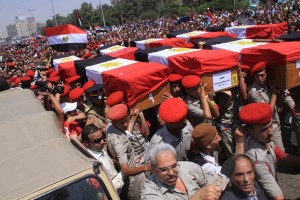
Mohamed Omar
According to its spokesperson Mahmoud Fawzy, the committee was established to investigate three main categories: civilians detained by military courts; revolutionaries detained by civilian courts; and detainees who are held without any official charges.
“[The committee] had strong representation from the Ministry of Interior and the Military judicial system… [so] there could not have possibly been an impartial committee,” Mohamed Ghorab, a member of the No Military Trials movement, said.
On 19 July, Morsy pardoned 572 military detainees held in military prisons, following the first report issued by the committee recommending their release. Most of the released were sentenced without proper evidence, Fawzy said. At least 13 Gama’a Islameya members were released among the first group; a matter which caused wide controversy. Gama’a Islameya was originally a jihadist group whose members were among conspirators who masterminded the assassination of late Egyptian president Anwar Al-Sadat.
A month later, the committee’s second report deemed 58 prisoners fit for release. The small number came as a surprise for the families of the detainees. Mohamed Gad Al-Rab, known as Sambo, one of the most prominent protesters sentenced by a military court, was among those released.
None of the 630 released prisoners were pardoned. They simply had their sentences commuted and still retain their criminal records.
Soon after releasing its second report in August, the committee submitted a final statement to the president, announcing an end to their mission.
According to committee member Mohamed Zare’, “we asked the president to intervene and pardon all the remaining revolutionary prisoners currently undergoing trial.”
According to a No Military Trials member, Maha Ma’moun, official records claim that over 1100 civilians are still in military courts.
During a speech delivered to commemorate the 6 October victory, Morsy promised to release more “revolutionary prisoners soon”.
“He made the promises during his running for president, but nothing has happened yet, Ghorab said. “The process for who is released is not clear; there is no transparency.”
Ministry of the Interior
Morsy’s promises to reform the security apparatus were particularly poignant for Egyptians, thousands of whom were still imprisoned and many more of whom had witnessed violence and abuse by state forces.
Even after the revolution, abuse by state security did not abate. Two reports issued this week by Amnesty International describe systematic violence carried out under SCAF rule.
The report highlights the two biggest acts of violence, the Mohamed Mahmoud Street clashes and protests after the Port Said massacre. However, they also touch on disturbing events concerning state security, including the torture of detainees. The report states, “the president has so far made no moves to introduce the significant reforms needed to guarantee a framework that would ensure that police operate within the law and do not repeat the abuses of the past. Reform can only start with the political will to target abuse, to eradicate torture, and to ensure that no member of the security forces is above the law.”
Mohamed Al-Menady, media spokesperson for the Ministry of Interior, said despite it being a time for reform, it is also a time of increased workload. “Our efforts in the field have definitely increased recently,” said Al-Menady. “Instead of facing 10 crimes per day, we face a 100 with the same number of forces.”
Head of the press office at the Ministry of Interior, Ayman Helmy, said efforts have increased. “Now we have stability in the streets and stability in the law,” due to having a president. “There’s a leap in the security presence… with concrete results.”
Helmy couldn’t say whether he sees a difference between the ministry under Mubarak and the ministry under Morsy. “You cannot issue a comparison because there are different surrounding situations,” he said.
Namira Negm, who formerly served in the Egyptian Ministry of Foreign Affairs and is currently researching security reform in Egypt, said, “as far as security sector reform is concerned, there were some changes in leadership, like the old days. Some of the generals changed their portfolios or moved to retirement. The real issue is that the rule of law is still absent from the streets of Cairo and we wonder if it is in the Ministry of Interior.
“The point with security sector reform is… for people to feel the outcome of that reform. The only way to do that is to have real security. That only comes about through proper implementation of the rule of law from the traffic up to the criminal.”
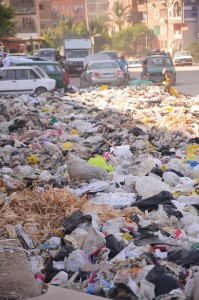
Hassan Ibrahim / DNE
Foreign policy
During his first 100 days in office, Morsy made nine trips to eight different countries for economic and political purposes,. Morsy’s first visit was to Saudi Arabia on 11 July to bolster the strong ties the two nations maintained during Mubarak’s presidency. Saudi Arabia is also the only country Morsy visited twice during his first 100 days in office.
The president’s second visit was a two-day trip to Addis Ababa for the African Union Summit, marking the first time in 15 years an Egyptian head of state had visited Ethiopia since Mubarak narrowly escaped an assassination attempt in 1995.
Morsy’s visit to Tehran drew international attention when he attended and spoke at the 16th Non-Alignment Movement summit. Morsy discussed the importance of restructuring fundamental flaws in the United Nations security council, emphasised the importance of the Palestinian plight, and was outspoken concerning the Syrian conflict, in which Iran has backed Bashar Al-Assad’s government.
Egypt’s first high-level diplomatic visit since Iran’s 1979 Islamic Revolution suggested more independent Egyptian foreign policy. While complete normalisation of relations between the two countries is not anticipated, communication enabled Egypt to reach out to Iran in an attempt to address the Syrian conflict through Morsy’s Quartet initiative. Although Morsy has continually called for action in Syria, he stopped short of supporting sending troops.
Morsy addressed the UN general assembly in New York on 26 September. “The new Egypt is determined to regain its standing among nations, and assume an effective role in global issues,” he told delegates.
He also spoke of the importance of resolving the Palestinian issue and invited other nations to contribute to his efforts to put an end to the Syrian crisis. He additionally stressed the importance of freedom of expression that did not incite hatred.
Turkish prime minister, Recep Tayyip Erdoğan, received Morsy on 30 September to discuss partnership between the two countries and the situation in Syria. He attended a conference hosted by the ruling Justice and Development Party in Ankara.
The president sought investment from foreign governments and businesses in trips to China, Belgium and Italy. At his 6 October address at Cairo Stadium, Morsy claimed that Egypt gained $10 billion worth of foreign investment and aid from his trips.

